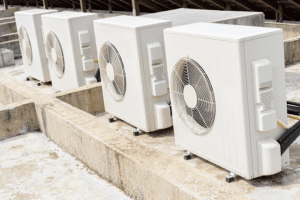Identifying the ideal solutions for commercial HVAC can sometimes be a time-consuming process, but what you learn along the way can have a significant impact on your expenses both now and in the future. Choosing the right system matters for your budget and comfort, so a look at every option out there is critical. With that in mind, could your business benefit from the installation of a rooftop air conditioning unit as opposed to a more traditional split setup? To answer that question, you’ll first need more information — such as how these units work. Here’s what you need to know to assess rooftop units fairly.
Rooftop Commercial Air Conditioning Units Aren’t Very Different
 At the end of the day, air conditioning is air conditioning — there’s nothing you can do to alter the fundamental physics behind the way cooling technology works. While some innovations improve efficiency, such as VRF/VRV technologies, the actual method of operation remains the same. In other words, there’s no useful distinction to make between the operation of a unit intended for residential use versus one intended for commercial use — they both use compressed refrigerant to cool air moving over special coils through a cycle of expansion and contraction.
At the end of the day, air conditioning is air conditioning — there’s nothing you can do to alter the fundamental physics behind the way cooling technology works. While some innovations improve efficiency, such as VRF/VRV technologies, the actual method of operation remains the same. In other words, there’s no useful distinction to make between the operation of a unit intended for residential use versus one intended for commercial use — they both use compressed refrigerant to cool air moving over special coils through a cycle of expansion and contraction.
The key difference between rooftop cooling units and other systems is that they are self-contained. In industry jargon, that makes them something called a “package unit,” which keeps everything — compressor, evaporator, condenser, and fan — all in one place. That’s in opposition to the “split system,” which places the compressor and condenser in unit “split off” from the evaporator and fan, which remain indoors. Package units make it simpler to locate the AC equipment for buildings where real estate may come at a premium price, but roof space on an existing structure is plentiful.
Some rooftop units have additional features that make them more attractive for businesses, especially in larger office buildings. These include options such as the “economizer,” an energy-saving tool that relies on outdoor air for cooling once the exterior temperature drops below a set threshold. The economizer draws in cold outside air while ventilating hot interior air, instead of cooling the interior actively. A unique benefit, this can be an easy way for some companies to save more on their cooling costs during some parts of the year. In general, though, there is nothing uniquely complicated about rooftop installations versus other types other than they are simply built for heavier duty in commercial applications.
The Key Benefits of Using a Rooftop Unit
Why opt to install a unit on the roof in the first place? The key reason should already be apparent: rooftop installations allow you to more easily take advantage of the convenience and power of commercial packaged units. However, there is a range of other benefits to rooftop ACs worth your consideration as well. These advantages include:
- Better security, as units do not remain accessible from the ground. In areas where thieves may steal metals such as copper from AC units, this is a valuable benefit.
- No need to try and fit additional HVAC components into a building where there is no room inside for such components
- The ability to quickly adapt or add on to a system as your needs grow and change into the future.
- Quieter operation; staff inside the building will never face distractions from a noisy air conditioner, as its position on the roof provides isolation.
- Better versatility for responding to different levels of cooling requirements
Because of these advantages, rooftop units are the preferable choice in many cases. Because they are not a different animal in terms of their operation, either, it is easy to transition from one type of system to another.
How Should You Size Rooftop Units?
If you do opt to install rooftop commercial air conditioning units, it’s important to keep in mind that you may need to spend more time thinking about what size to purchase. There are additional considerations that go beyond the raw power of the unit. For example, where on your roof should you place these units? Air conditioners are heavy, and commercial-grade units even more so; it’s critical to select a spot that can support the weight of the unit without causing any risk of structural damage. These considerations, alongside information about your specific cooling needs, will inform the choices you make regarding the size and power of the unit. Answering these questions alone can be a recipe for problems — so seek a reputable contractor instead.
Explore Options in Depth with Professional Help
Rooftop commercial air conditioning units can provide years of reliable, energy-efficient operations for businesses of all sizes. Getting there, though, requires plenty of help, from selecting the right units to arranging their movement to the roof and ultimately their installation. To learn more, select a trusted HVAC contractor in your area. Take the opportunity today to ask about how you could make these units work for your business.

